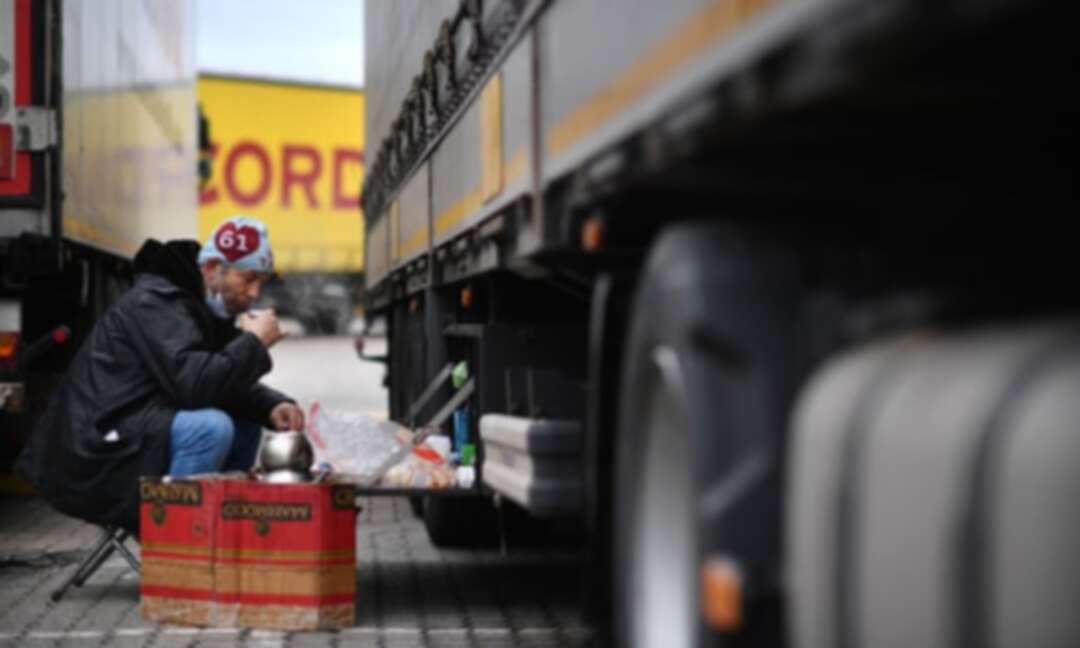-
Brexit: British business leaders warn of 'substantial difficulties' at UK ports

Letter says government needs to act quickly to resolve customs issues faced by exporters following Brexit
The leaders of Britain’s five largest business groups have warned the government that firms face “substantial difficulties” at UK ports since Brexit, with the prospect of a “significant loss of business” if the situation is allowed to continue.
Following a round table meeting on Thursday evening with Cabinet Office minister Michael Gove, a letter was issued by the CBI, the British Chambers of Commerce, the manufacturers’ group Make UK, the Federation of Small Businesses and the Institute of Directors.
The letter said the government needed to act quickly to overcome “the sizeable obstacles” faced by exporters.
With hold-ups at UK ports worsening and many lorries making return journeys empty following difficulties obtaining customs certificates, the business groups said ministers needed to act quickly.
The letter was published after Gove appeared to play down the significance of the difficulties faced by businesses struggling to overcome customs barriers, and what they described as a lack of coherent advice from government departments about new EU trading rules following Brexit.
Gove said after the meeting, which the business leaders believed was private, it is understood, that “some businesses are facing challenges with specific aspects of our new trading relationship with the EU”.
He added: “I want to let them know that we will pull out all the stops to help them adjust.”
The business groups said: “A range of problems were discussed, including the substantial difficulties faced by firms adapting to the new customs processes, sizeable obstacles to moving goods through the Dover-Calais route and the shortage of informed advice from both government and specialist advisers alongside a number of others.”
They warned that grace periods agreed with the EU would expire over the next two months at a time when cross-border traffic, which is usually low in January, was due to grow. Unless measures were put in place to smooth customs procedures, the situation would deteriorate, they said.
Last week it emerged that many small UK businesses are being told by advisers working for the Department for International Trade (DIT) to register subsidiaries within the EU single market, from where they can distribute their goods far more freely.
Officials were found to be advising firms that it was the best way to circumvent border issues and VAT problems that have been building up since 1 January.
A separate report has found that the majority of lorries travelling from the UK to the EU via Calais and Dunkirk are empty, suggesting that the situation at the border has worsened since the UK agreed a trade deal with the EU.
According to figures obtained by ITV from the Prefecture Hauts-de-France et du Nord for the week ending 24 January, an average of 3,400 lorries a day travelled from the Port of Dover and Eurotunnel to Northern France. Of these, 65% were empty.
The data also shows that heavy goods vehicle traffic in both directions across the Channel was down 30% on normal flows.
There were also delays for lorry drivers at the French border after it was found that only one in 10 export health certificates – which are required for consignments of food, including for meat and fish – were correctly completed.
source: Phillip Inman
Levant
You May Also Like
Popular Posts
Caricature
BENEFIT Sponsors BuildHer...
- April 23, 2025
BENEFIT, the Kingdom’s innovator and leading company in Fintech and electronic financial transactions service, has sponsored the BuildHer CityHack 2025 Hackathon, a two-day event spearheaded by the College of Engineering and Technology at the Royal University for Women (RUW).
Aimed at secondary school students, the event brought together a distinguished group of academic professionals and technology experts to mentor and inspire young participants.
More than 100 high school students from across the Kingdom of Bahrain took part in the hackathon, which featured an intensive programme of training workshops and hands-on sessions. These activities were tailored to enhance participants’ critical thinking, collaborative problem-solving, and team-building capabilities, while also encouraging the development of practical and sustainable solutions to contemporary challenges using modern technological tools.
BENEFIT’s Chief Executive Mr. Abdulwahed AlJanahi, commented: “Our support for this educational hackathon reflects our long-term strategic vision to nurture the talents of emerging national youth and empower the next generation of accomplished female leaders in technology. By fostering creativity and innovation, we aim to contribute meaningfully to Bahrain’s comprehensive development goals and align with the aspirations outlined in the Kingdom’s Vision 2030—an ambition in which BENEFIT plays a central role.”
Professor Riyadh Yousif Hamzah, President of the Royal University for Women, commented: “This initiative reflects our commitment to advancing women in STEM fields. We're cultivating a generation of creative, solution-driven female leaders who will drive national development. Our partnership with BENEFIT exemplifies the powerful synergy between academia and private sector in supporting educational innovation.”
Hanan Abdulla Hasan, Senior Manager, PR & Communication at BENEFIT, said: “We are honoured to collaborate with RUW in supporting this remarkable technology-focused event. It highlights our commitment to social responsibility, and our ongoing efforts to enhance the digital and innovation capabilities of young Bahraini women and foster their ability to harness technological tools in the service of a smarter, more sustainable future.”
For his part, Dr. Humam ElAgha, Acting Dean of the College of Engineering and Technology at the University, said: “BuildHer CityHack 2025 embodies our hands-on approach to education. By tackling real-world problems through creative thinking and sustainable solutions, we're preparing women to thrive in the knowledge economy – a cornerstone of the University's vision.”
opinion
Report
ads
Newsletter
Subscribe to our mailing list to get the new updates!






















